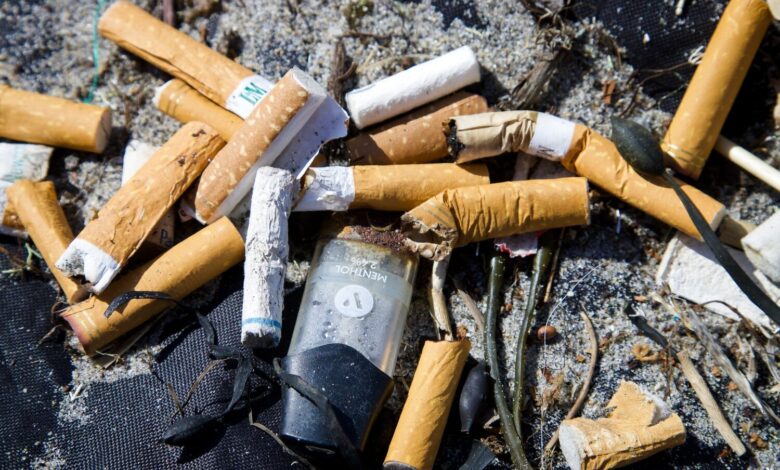How Cigarette Butts Hurt Our Health and Environment

Cigarette butts may seem small and insignificant, but they’re causing major environmental and health issues. With millions being discarded every day, these cigarette butts are a pervasive form of litter that contribute to pollution in a multitude of ways. Surprisingly, cigarette butts are the most widely littered item worldwide, with trillions being discarded improperly each year.
The enormous quantity of cigarette butts discarded annually represents a significant environmental challenge. Their accumulation continues contaminating our natural surroundings, adversely affecting ecosystems and human health. Littered cigarette butts not only create an eyesore but also introduce a variety of toxic substances into our environment. These small pieces of waste may seem inconsequential, but their collective impact is monumental, making it crucial to address this issue head-on.
Cigarette Butt Pollution and Its Scope
It’s hard to fathom, but cigarette butts are the most littered item globally. According to the Ocean Conservancy, cigarette butts account for about 32% of all collected waste during cleanup drives. Their widespread presence poses a significant environmental challenge. Given their small size, many people underestimate the impact of cigarette butts, but their collective effect is enormous. This ubiquitous litter is found on streets, parks, beaches, and even in remote natural areas, making it a widespread problem.
The sheer volume of cigarette butts found in the environment is staggering. During the International Coastal Cleanup event, volunteers collected millions of cigarette butts from coastlines around the world, underscoring the pervasive nature of this litter. The improper disposal of cigarette butts not only degrades natural beauty but also creates long-lasting problems for wildlife and human communities alike.
Toxins in Cigarette Butts
Each cigarette butt contains a filter filled with toxic substances such as nicotine, lead, and arsenic. When these butts are carelessly discarded, these toxins leach into the soil and waterways. Research indicates that these pollutants can remain in the environment for over a decade, slowly degrading ecosystems. This gradual release of toxins can have a long-lasting impact on soil quality and water safety. The chemicals found in cigarette filters are designed to trap harmful substances from entering the human body, but once discarded, these toxins become environmental hazards.
Furthermore, the cellulose acetate used in cigarette filters is a form of plastic that does not readily biodegrade. As these filters break down into smaller pieces, they release microplastics that add to the staggering plastic pollution problem. These microplastics can further absorb and concentrate toxic chemicals, exacerbating their harmful effects. The persistent nature of these pollutants means they can contaminate environments for years, if not decades, making every discarded cigarette butt a long-term environmental issue.
Impact on Marine Life
Once cigarette butts enter waterways, they pose a severe threat to marine life. Fish and other aquatic creatures can ingest these harmful chemicals, leading to health complications and even death. The toxins can also bioaccumulate, entering the food chain and impacting larger marine animals. For instance, small fish and shellfish can consume microplastics from cigarette filters, which bigger predators, including humans, eat. This has a cascading effect, further endangering the marine ecosystem.
The harmful impact of cigarette butts on marine life is a well-documented phenomenon. Studies have shown that even a single cigarette butt can release enough toxins to kill fish in a small body of water. The ingestion of these toxic substances can cause a range of health problems in marine organisms, from reduced growth and reproductive issues to outright mortality. The presence of cigarette butts in aquatic environments not only threatens individual species but can also disrupt entire ecosystems, making it an urgent environmental concern.
Human Health Implications
Humans are not immune to the effects of cigarette butt pollution. Contaminated water sources can lead to a variety of health issues. Moreover, when marine life that has ingested toxins is consumed by humans, there is a risk of bioaccumulation of harmful substances in our bodies, causing long-term health problems. This could include cancers, organ damage, and developmental issues in children. Communities relying on fishing and marine resources are particularly vulnerable, as their primary food sources may become contaminated.
The interconnectedness of our ecosystems means that the pollution caused by cigarette butts can have far-reaching effects. Polluted water sources can carry toxic substances into agricultural fields, homes, and urban areas, affecting millions. This can lead to increased healthcare costs and lost productivity, compounding the economic and social impacts of cigarette butt pollution. Protecting human health requires a concerted effort to address this pervasive form of litter at its source.
Sustainable Solutions
Addressing the issue of cigarette butt pollution requires a multifaceted approach. Cleanup initiatives, such as World Cleanup Day, have had some success, but more needs to be done. Educating smokers about the impact of their litter and providing more disposal options are crucial steps towards a sustainable solution. Additionally, some countries are implementing stricter cigarette waste disposal regulations to reduce littering at the source. For instance, France has introduced fines for littering cigarette butts, and other nations are following suit. Promoting biodegradable cigarette filters could also be an innovative solution to reduce environmental impact.
Collaborative efforts between governments, non-profits, and the private sector are essential to create lasting change. Public awareness campaigns and educational initiatives can help shift cultural attitudes toward responsible cigarette disposal.
The Role of Policy and Regulation
Governments play a crucial role in mitigating cigarette butt pollution through policy and regulation. Initiatives like implementing higher fines for littering, mandating butt receptacles in public areas, and encouraging tobacco companies to take responsibility for post-consumption waste could significantly curb the pollution problem. Extended producer responsibility (EPR) policies could mandate tobacco companies to manage the waste generated by their products, incentivizing them to develop eco-friendly alternatives. By enacting and enforcing stringent laws, we can hold individuals and corporations accountable for their environmental impact.
Conclusion and Call to Action
The issue of cigarette butt pollution is more pressing than many realize. The repercussions on our health and environment are severe and wide-ranging. It’s incumbent upon individuals, communities, and governments to take decisive action in reducing cigarette butt waste, thereby preserving our natural resources and protecting public health. By raising awareness, implementing stricter regulations, and promoting responsible behavior, we can collectively address this pervasive problem. The fight against cigarette butt pollution requires vigilance and commitment from every sector of society, ensuring that future generations inherit a cleaner, healthier planet.
Everyone has a role to play in combating cigarette butt pollution. Whether properly disposing of cigarette waste, participating in cleanup efforts, or advocating for stronger policies, individual and collective actions can make a significant difference. By working together, we can create a sustainable future where our environment and health are protected from the harmful effects of cigarette butt litter.



